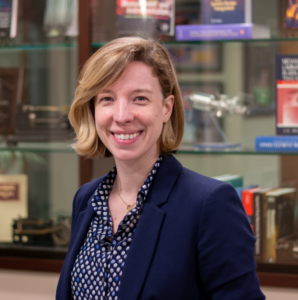- This event has passed.
Mechanical Engineering Seminar Series: Astrid Layton
September 26, 2023 @ 3:30 pm - 4:30 pm
How Nature’s Systems Can Guide More Resilient and Sustainable Human Network Design
Astrid Layton
Assistant Professor of Mechanical Engineering and Donna Walker Faculty Fellow
Texas A&M University

1200 EECS
September 26, 2023
3:30 PM
ME Seminar Zoom link
Passcode 692510
Add ME Seminar to Google Calendar

Abstract
Inspiration from nature has produced some fascinating, novel, and life changing solutions for the human world. Most of these bio-inspired designs however have been product based, but taking a systems perspective when we look to nature taps inspirations that can improve the critical networks we depend on. This talk focuses on biological ecosystems in particular, complex networks of interacting species that are able to support individual needs while maintaining system-level functions during both times of abundance and unexpected disturbances. This talk will show how these networks can offer inspiration for achieving both sustainability AND resilience. Quantitative ecosystem descriptors and analysis techniques adapted from ecology enable desirable ecosystem characteristics to be used as design guides for things like industrial resource networks, water networks, supply chains, and power grids.
Bio
Dr. Astrid Layton is an assistant professor and Donna Walker Faculty Fellow at Texas A&M University in the J. Mike Walker ’66 Department of Mechanical Engineering. She received her Ph.D. in Mechanical Engineering from Georgia Institute of Technology in Atlanta, Georgia. Her research uses interdisciplinary collaborations to solve large-scale system problems, developing knowledge that supports designers and decision makers. Dr. Layton is an expert on bio-inspired systems design, with a focus on the use of biological ecosystems as inspiration for achieving sustainability and resilience in the design of complex human networks/systems/systems of systems. Examples include industrial resource networks, power grids, cyber-physical systems, supply chains, innovation processes, and water distribution networks.
